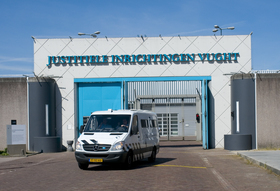Aparte detentie terroristen overbodig

Het heeft geen zin om extremistische gedetineerden af te zonderen om te voorkomen dat medegevangenen onder hun invloed radicaliseren. Het huidige Nederlandse beleid, na de moord op Theo van Gogh in 2004, om moslimextremisten op een kluitje te plaatsen in één gevangenis is onder tijdsdruk tot stand gekomen, terwijl er geen aanwijzingen zijn dat dat nodig is. Er zou juist meer aandacht moeten komen voor re-integratie van extremisten. Tot die conclusie komt sociologe Tinka Veldhuis in haar promotieonderzoek waarop ze 26 maart promoveert aan de Rijksuniversiteit Groningen.
Na de recente aanslagen, zoals op de redactie van Charlie Hebdo, staat radicalisering weer hoog op de politieke agenda. De vrees bestaat dat extremistisch gedachtengoed zich ook via gevangenissen verspreidt onder gedetineerden die daar vatbaar voor zouden zijn. Maar die vrees is niet gegrond, zegt Veldhuis: “Ik heb voor mijn onderzoek interviews gehouden met gedetineerden, waaronder ook veronderstelde extremisten, met gevangenispersoneel en beleidsmedewerkers van Justitie. Het blijkt dat jihadisten, of hoe je ze wilt noemen, onderaan de pikorde staan in de gevangenis. Het is dus maar de vraag of ze invloed hebben. Dat wil niet zeggen dat er niet af en toe een man met charisma tussen zit die wél zijn ideeën kan verspreiden, maar daarvoor is zo’n algemene afzonderingsmaatregel niet nodig. Veel extremisten zouden juist genuanceerder kunnen gaan denken als ze in een gewone gevangenisgemeenschap verkeerden.”
Ondoordacht
Nederland ging er naar aanleiding van de moord op Theo van Gogh toe over om enkele tientallen extremistische moslims, zelfs nog voor hun veroordeling, apart te zetten in speciale terroristenafdelingen. Internationaal loopt Nederland zelfs voorop met dit beleid. Maar het is ondoordacht tot stand gekomen, stelt Veldhuis vast: “Uit een reconstructie blijkt dat de tijdsdruk hoog was. Er moest snel besloten worden en een deel van het gevangeniswezen was voor deze lijn. Een deel trouwens ook niet, want de Dienst Justitiële Instellingen vond het niet nodig. En opmerkelijk genoeg hadden Engeland en Frankrijk in het verleden slechte ervaringen met vergelijkbaar beleid. Maar de harde lijn was politiek het meest aantrekkelijk.”
Contraproductief
Sinds 2006 zijn zo’n 80 jihadisten in Nederland bij elkaar geplaatst. Volgens Veldhuis kan dat contraproductief zijn omdat ze elkaar alleen maar in hun extreme opvattingen versterken. Bovendien kan het strikte regime waar ze aan onderworpen zijn ze verder radicaliseren: “Dat roept meer woede op. Vaak gaat het om mensen die alleen nog maar verdachte zijn. Ze worden al bij voorbaat in die hoek geplaatst. Áls we al doorgaan met dit regime zouden we het in elk geval een minder stigmatiserende naam moeten geven: De Sluis bijvoorbeeld, en niet de Terrorismeafdeling.”
Re-integratie
Als alternatief stelt Veldhuis voor dat gevangenisbeleid voor extremisten in het teken moet staan van hun re-integratie in de samenleving. “Als het risico op het radicaliseren van medegevangenen inderdaad minder groot is dan we denken, dan heeft het geen zin om deze gedetineerden in strikte regimes te plaatsen waar ze uiteindelijk alleen maar radicaler uitkomen”, aldus Veldhuis. “Als ze hun straf hebben uitgezeten komen ze weer in de samenleving. Vanuit veiligheidsoogpunt is het dan juist belangrijk om ervoor te zorgen dat ze daarin goed kunnen meedraaien en niet blijven vasthouden aan dat extremistische gedachtegoed.”
Lees hier het proefschrift
Studium Generale Groningen
De Amerikaanse terrorismedeskundige en voormalig gevangenisbewaarder Professor Mark Hamm - tevens aanwezig bij de promotie van Tinka Veldhuis - geeft woensdag 25 maart een lezing bij Studium Generale Groningen, waarbij Veldhuis coreferent is. Hamm deed een vergelijkbaar onderzoek als Veldhuis in de VS. Voertaal Engels.
Curriculum Vitae
Tinka Veldhuis (Amstelveen, 1983) studeerde sociologie aan de Rijksuniversiteit Groningen (RUG). Ze deed haar promotieonderzoek bij het Interuniversity Centre of Social Science Theory and Methodology (ICS). De titel van haar proefschrift is Captivated by Fear: An Evaluation of Terrorism Detention Policy. Promotors zijn prof. dr. S. Lindenberg, Prof. E. Gordijn en Prof. R. Veenstra. Ze is momenteel universitair docent bij de afdeling Criminologie van de Universiteit Leiden.
Meer nieuws
-
17 februari 2026
Van ghostbuster tot rampenonderzoeker
-
03 februari 2026
‘Daar zit een goeie kop op’
-
20 januari 2026
Alcohol, appen en e-bikes
